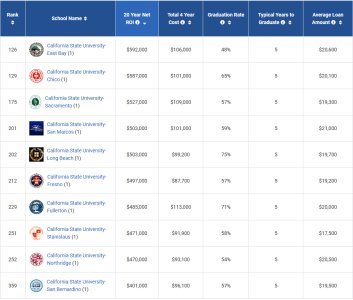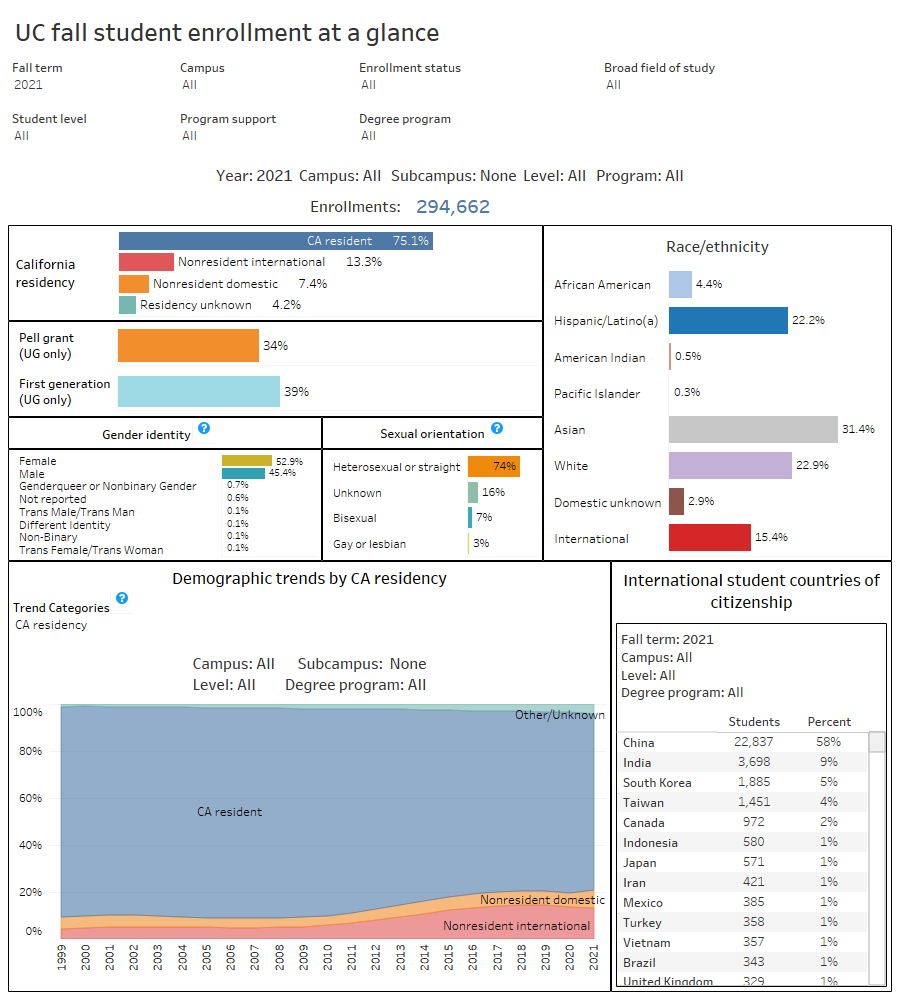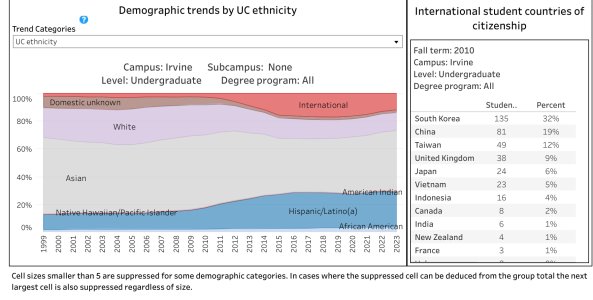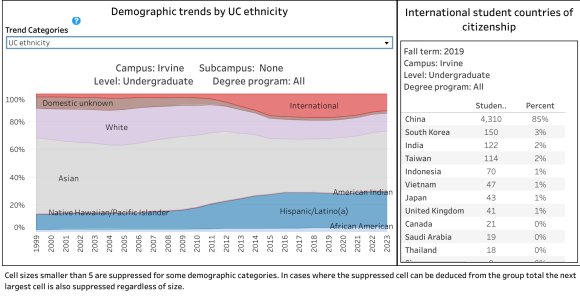panda
Well-known member
Last edited:

I don't know how they are calculating cost, but the tuition at CSU Fullerton is $7k, so the total 4-year cost should be $30k, which means the ROI is actually higher than Berkeley in percentage terms.The 20 Year Net ROI at California State University seems to do better than the bottom two UC Colleges UC Riverside and Santa Cruz. Better to attend California State University vs UC Riverside and Santa Cruz.
@qwerty, Cal State Fullerton doesn't seem to be a great ROI. They make half the salary of a Cal grad. Graduate rate at Fullerton is 71% vs 93% at Cal.

I noticed an interesting demographics stats for UC Irvine from my US NEWS Top Colleges ranking 2010 Edition. Can you please let me know if this is accurate?
In the 2010 Student profile demographics: 52% were Asian and 29% were White. Fastforward to 2023, UCI student profile demographics is 27% Asian and 38% White. This is almost a 50% drop in Asian student attendance. Did Asian students suddenly lose interest in attending UCI? or is this discrimination against Asian student applicant?
I am sort of wondering now if this is the reason why UC Admissions removed the SAT requirements in 2020 because Asian students typically excel at them.
Would like get others insights and opinions on this demographics shift of Asian students from from 2010 - 2023 at UCI.
That is effectively what the SAT test does. It's well documented that high-income families have the upper hand when it comes to the SAT, so let's get rid of the test and just give the rich kids bonus points on their college applications for being wealthy. We could maintain the same lack of fairness as the current system, while saving lots of time & money by no longer administering the test.What do you mean by lets rank order applicants based on family income and give the rich kids the upper hand in admissions?
That is effectively what the SAT test does. It's well documented that high-income families have the upper hand when it comes to the SAT, so let's get rid of the test and just give the rich kids bonus points on their college applications for being wealthy. We could maintain the same lack of fairness as the current system, while saving lots of time & money by no longer administering the test.
Where are your stats for UCI coming from?What do you think happened for the admissions to UCI? How do you explain 52% Asian students at UCI, dropping to 27% from 2010 - 2023? and the White students increasing in population from 29% to 38%. Perhaps you are closer to this than I am, but I am curious how the admission criteria changed from 2010 and 2023.

In 2019 there were more international undergraduate students than white Americans?

Fall enrollment at a glance
Fall undergraduate and graduate enrollment by discipline, gender, ethnicity, residency, country (for undergraduates) and campus.www.universityofcalifornia.edu
@Loco_local
Think about it. If you were the CEO of UCLA, Inc and each CA student you admit pays you $14k vs International student who pays you $43k. Wouldnt you admit as many international students as possible to maximize revenue and profit?
Is it really ROI if international students can’t even get a work visa after they graduate? Tax payers are getting ripped off. It looks like the 10% Asian American decline in enrollment was because they admitted ten percent more students from Asia. UCI is still 50% Asian, but ten percent of them are foreigners.@Loco_local
Think about it. If you were the CEO of UCLA, Inc and each CA student you admit pays you $14k vs International student who pays you $43k. Wouldnt you admit as many international students as possible to maximize revenue and profit?


Not understanding your logic. What does international students not getting a work visa have anything to do with the University's ROI? How do tax payers get ripped off? It's the opposite. Taking international students or out of state students HELP tax payers since those students have to pay EXTRA tuitions to offset the costs.Is it really ROI if international students can’t even get a work visa after they graduate? Tax payers are getting ripped off. It looks like the 10% Asian American decline in enrollment was because they admitted ten percent more students from Asia. UCI is still 50% Asian, but ten percent of them are foreigners.
"tax-payer" ROI, which I take as professionals as employees and entrepreneurs who increase the size of the state economy.Not understanding your logic. What does international students not getting a work visa have anything to do with the University's ROI? How do tax payers get ripped off? It's the opposite. Taking international students or out of state students HELP tax payers since those students have to pay EXTRA tuitions to offset the costs.